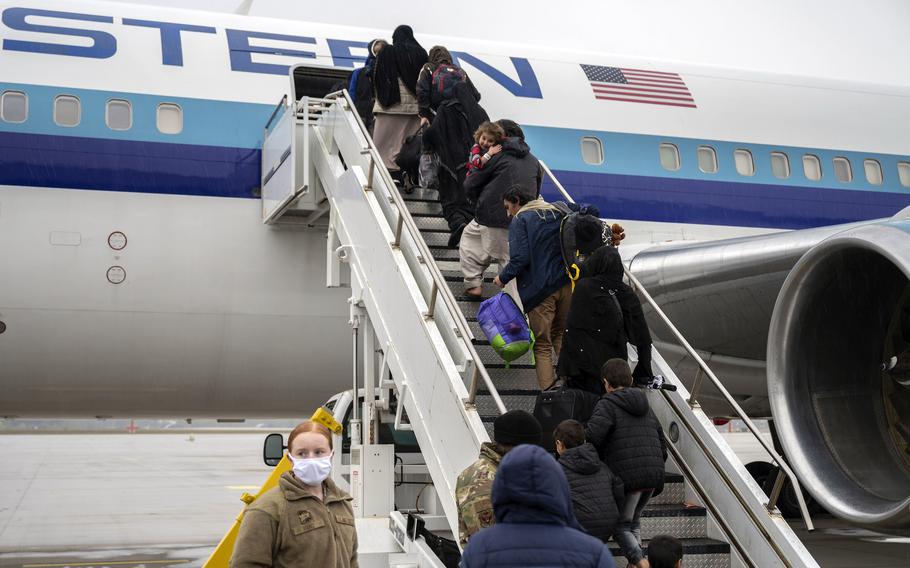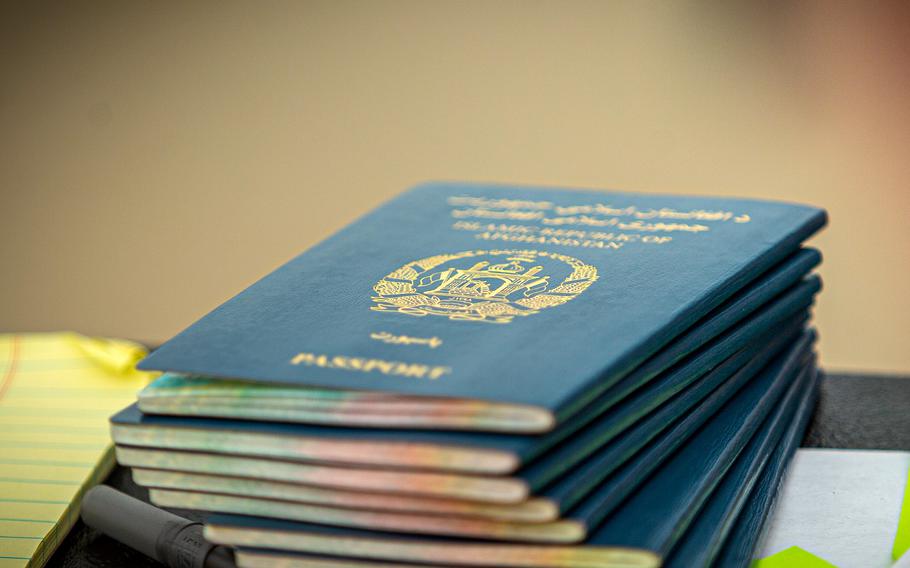
Afghan evacuees board a flight to the U.S. from Ramstein Air Base, Germany, Oct. 30, 2021.The Justice Department inspector general's office recently released an audit stating that the FBI was effective in vetting Afghans who fled to the U.S. immediately following the fall of the U.S.-backed government in Kabul. (Senior Airman Milton Hamilton)
The FBI effectively screened tens of thousands of Afghan evacuees who came to the U.S. immediately following the collapse of the Kabul government in 2021, according to a newly released audit from the Justice Department’s inspector general.
The report comes as veterans and advocates fight to preserve Operation Enduring Welcome, the long-term program to resettle Afghans who assisted the U.S. during the nearly 20-year war. The Trump administration’s budget request for the next fiscal year would defund the program.
Administration officials have said they are ending funding for the program as part of an effort to ensure that refuge is provided “only to those credibly at risk while maintaining broader U.S. national security priorities.”
Groups like #AfghanEvac, a veteran-run group that advocates for Afghans, say the program has been proven to be secure and that ending it would leave them vulnerable to the Taliban.
The audit, released Tuesday, focuses on Afghans who traveled to the U.S. between July 2021 and September 2022. It found that the FBI’s terrorist screening center properly identified 55 evacuees on the terrorist watch list and followed the correct processes to protect against any threats.
“Overall, we found that each of the responsible elements of the FBI effectively communicated and addressed any potential national security risks identified,” the DOJ inspector general report said.
In the weeks leading up to the Taliban’s takeover of Kabul, the U.S. already had begun processing Afghan nationals who assisted the U.S. and were eligible for special immigrant visas.

Passports of Afghan civilians await vetting on Marine Corps Base Quantico, Va., Sept. 10, 2021. The FBI was effective in vetting Afghans who fled to the U.S. immediately following the fall of the Kabul government, the Justice Department's inspector general said. (Brian Bolin Jr./U.S. Marine Corps)
The seizure of the capital on Aug. 15, 2021, put those allies at increased risk of retaliation from the Taliban and prompted the U.S. to expand its efforts to evacuate them.
The typical process for vetting travelers was “overtaken by the need to immediately evacuate and protect the lives of Afghans,” the audit said, “increasing the potential that bad actors could try to exploit the expedited evacuation.”
As a result, Homeland Security, in coordination with the Pentagon, State Department and U.S. intelligence community, had to establish a unique system to screen and vet the Afghan evacuees. The audit described it as a multi-layered, dynamic process that continues today.
The audit did identify one weak point in the process due to limited access to databases and information during the initial wave of evacuations, but said any potential risk was mitigated through subsequent vetting.
The 55 evacuees identified either were already on the terrorist watch list but made it to a U.S. port of entry or were added to the watch list during evacuation and resettlement. As of July 2024, 46 of the evacuees had been removed from the watchlist and the remaining nine all were being properly tracked.
The inspector general also noted one case where an Afghan evacuee, who entered the U.S. in September 2021, was charged by the Justice Department for conspiring to conduct a terrorist attack on Election Day in 2024 on behalf of the Islamic State.
Shawn VanDiver, president of #AfghanEvac, said the arrest of the would-be terrorist and the audit are proof that the U.S. vetting system for Afghans is sound.
“In short, it wasn’t perfect, but it was effective — and transparent,” he said in a statement.
In addition to ending Operation Enduring Welcome, the administration also has moved to close the office of the Coordinator for Afghan Relocation Efforts within the State Department and transfer those duties to the Afghan Affairs Office.
The Department of Homeland Security also recently announced it would terminate temporary protected status for Afghan nationals, prompting outcry from advocates who say it could force Afghans to return to a hostile country.